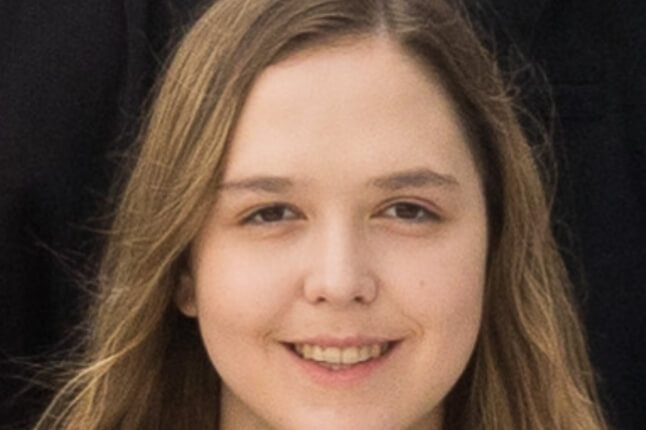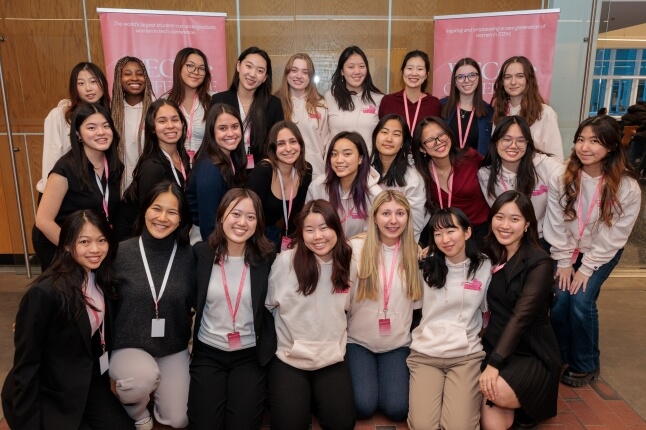News
For their master's student capstone project, Susannah Su and Nathan Zhao (not featured) used ChatGPT to develop three tools to help frontline negotiators quickly process large amounts of documents (Brittany Buzzutto/SEAS)
Data science and computational science and engineering master’s students at the Harvard John A. Paulson School of Engineering and Applied Sciences (SEAS) take “AC297R: Computational Science and Engineering Capstone Project.” Taught by Weiwei Pan, Assistant Director for Graduate Studies in Data Science, the course groups students together for semester-long research projects in which they work with “client” organizations to tackle real-world challenges.
AI-Assisted Frontline Negotiation
Susannah Su (AB/SM ‘25), Nathan Zhao (AB/SM ‘24)
Client: Frontline Associates
What real-world challenge does this project address?
Negotiators usually have to read through hundreds of pages of documents, extract and synthesize useful information to form their arguments and agenda for negotiations. In frontline or crisis negotiation, time is the key. Hence, how to process and analyze a large amount of documents very quickly becomes an important question that negotiators care about. This project aims to provide a solution to this question. Using the three tools that we developed empowered by ChatGPT, negotiators will be able to reduce the time needed to go through and analyze all the documents from days to just minutes.
How does this research attempt to solve that real-world challenge?
We made use of existing negotiation preparation frameworks to develop instructions for our customized GPT bot, then tested the instructions to improve the quality of the responses through prompt engineering. We found that our tools generate stable responses and very similar responses to actual human practitioners. On top of that, we also developed a crisis negotiation simulator that will help train practitioners by simulating a real life scenario. The negotiator trainer can use the voice-to-voice function in ChatGPT to actually practice negotiating with different stakeholders in the simulated scenario. We interviewed actual practitioners to get their opinions on using AI in assisting negotiations, and presented at the Berlin Moot Conference for peacemaking to other negotiators.
How did you apply the skills you learned at SEAS to your project?
We used a lot of the natural language processing and language model techniques we learned in class, as well as a technical mindset and problem solving skills that we have built at SEAS.
What part of the project proved the most challenging?
The most challenging part was working with partners that are not technical. As engineers, we talk in engineers’ languages. But to solve real-life problems, oftentimes our partners come from non-technical backgrounds. It is hard but impactful to be able to translate the needs of non-technical partners into a technical problem, then communicate our progress and concerns in languages that non-technical people can understand.
What part of the project did you enjoy the most?
We really enjoyed the day when we interviewed the experienced crisis negotiator Kirk Kinnell. We let him try the crisis negotiation simulator, and just seeing him getting so excited about AI and actually “negotiating” with the language model was super satisfying and fun.
What did you learn, or skills did you gain, through this project?
This project actually made us start thinking about doing research in the future. The most important lesson we have learned is that “college is what you make of it.” Our group included first-generation college students who never thought about studying STEM in high school, not to mention doing a concurrent master in STEM and even considering a Ph.D. We started interacting with more of the research community here because of this project, and we found it very exciting to have the opportunity to tackle problems that you really care about using the skills we have. There are so many opportunities here and so many people who are willing to mentor and help you. You have to be proactive enough to make the most out of these opportunities. We are very grateful to all of the people who have helped and guided me in the past, and now we are in a position doing something that we never thought was possible.
Topics: Academics, AI / Machine Learning, Applied Computation, Computer Science
Cutting-edge science delivered direct to your inbox.
Join the Harvard SEAS mailing list.
Press Contact
Matt Goisman | mgoisman@g.harvard.edu


